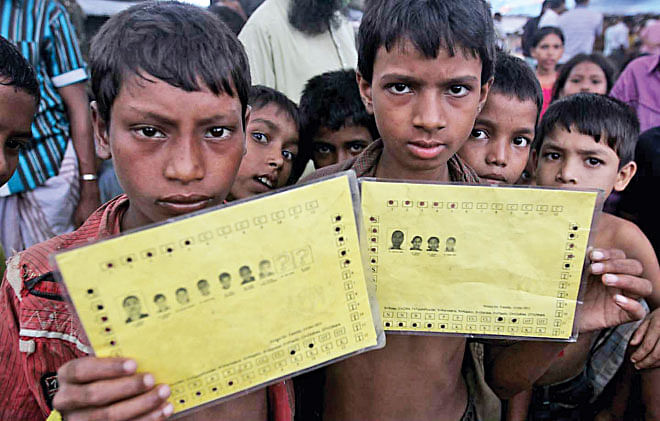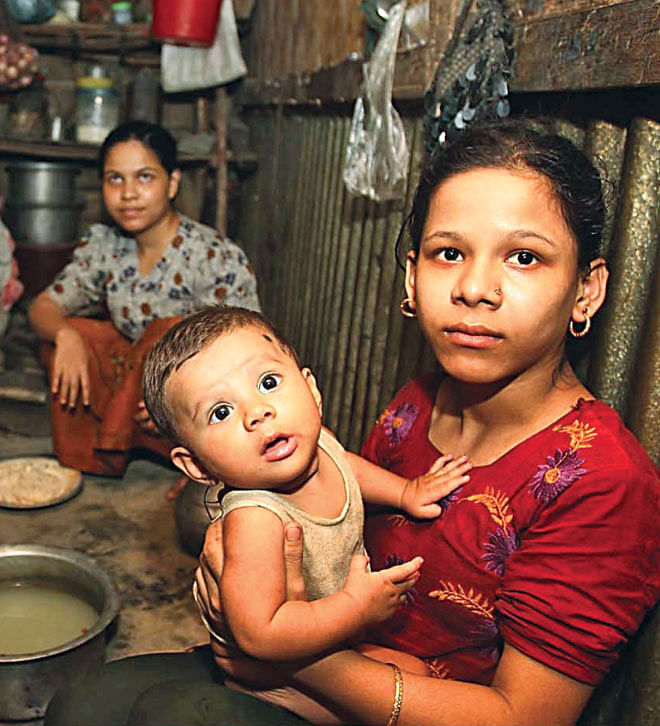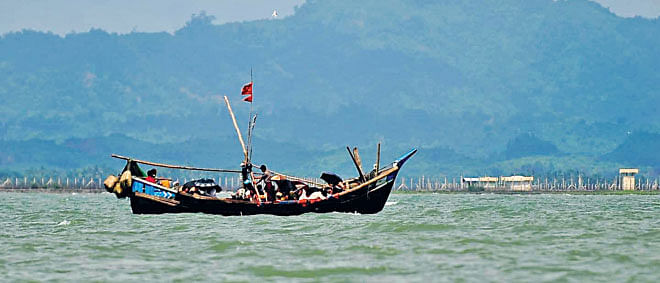BETRAYED, DENIED AND ABANDONED

The wave cuts a sharp arc at the boats landed on the shore of Shamlapur in Cox's Bazar. It was a busy day as usual. Fishermen were rushing to sell the fish they had caught in different hatcheries. Around hundred boats were waiting to unload all the fish stocked in them. Makeshift houses lined the shore line, their inhabitants busy with the ongoing activities of the shore.
Here at Shamlapur undocumented refugee camps are home to the people of four Rohingya villages who fled inter-communal conflict in Burma. Living at the shore line is quite difficult, since there is the risk of being swept away by the tides which can flood the area. Materials are so scarce that many families have put together leaves, sticks and plastic to make their homes. While men fish to earn their living, the women stay at home. But life is not simple here since arbitrary torture is a part of their everyday life.

Nuruddin, a Bengali speaking teenager from the adjacent village, said that even though the Bengalis help the refugees by providing them employment, the Rohingyas are often times attacked for no reason whatsoever. “Most Rohingyas earn their living by fishing in the sea in boats owned by Bengalis. If anything goes wrong with the boat, they have to face death.” He then pointed towards a high land at the sea shore of Shamlapur, “That over there is the graveyard for all those who died at the sea or were killed for arbitrary reasons,” he added.
When we entered the refuge village of Shamlapur, the inhabitants seemed very happy. Neighbours were laughing at each other's jokes. Some were decorating their houses with colourful paper. Sultana Begum (not her real name), a middle aged refugee, informed us that a bride was coming from Akyub that day. “The Burma shorkar (government) does not allow us to marry. If a couple wants to get married, they have to pay a huge amount of money to law enforcers. This has been happening since 2012. They do not even allow us to move from one village to another.”
After the recent ethnic violence erupted in September 2012, many Rohingyas were sent to segregated refugee camps all around the state, with strict restrictions placed on their rights to travel, to continue higher education and even on their right to marry. Whatever the cause of the latest riot, the conflict between Rakhine Buddhists and Rohingya Muslims in the Rakhine state has deep roots. In 1826 when the British occupied Arakan after the First Anglo Burmese War, the British policy was to encourage the immigration of Indians, mostly Bengali, inhabitants from different areas to migrate into the fertile lands of Arakan.
Burma's ethnic balance shifted in the early 20th century with massive influx of immigrants from both India and Bangladesh. According to the British census, the Muslim population in Arakan increased from 58,255 to 178,647 between 1891 and 1911. Facilitated by the East India Company, Bengalis sought agricultural work in the sparsely populated valleys of Arakan, as well as other regions in Myanmar. The East India Company extended its Bengal administration to Arakan, lifting the internal boundary between the two colonial territories.
Historians and prominent Burmese intellectuals explain that Burmese natives reacted with a feeling of superiority and fear as Indian immigrants became a majority in Burma's major cities including Rangoon. And the natives were not happy with the new migrants.
Even the British Empire in Burma created identities based on people's religions and ethnicities, as evident through the creation of the census in 1872. In fact in British surveyor Francis Buchanan's research “A Comparative Vocabulary of Some of the Languages Spoken in the Burma Empire,” published in 1799, he mentioned that “the Mohammedans settled in Arakan called the country Rovingow while the Persions called it Rekan.” The Rohingya identity probably led to a greater divide between the Burmese locals and other ethnicities. The differences became so deep-rooted that anti-Indian riots broke out in Burma during the colonial period. The Rohingya identity, however, was not even mentioned in the British census; the survey did not even mention their identity according to their birth place.

In 1977, a nationwide campaign began in the Rakhine State to register the citizens with the military government running a mass campaign to prosecute illegal entrants. After encountering mass arrests and violent persecution in the hands of the military, Rohingyas decided to flee to Bangladesh, triggering a mass migration of around 250,000 to enter the country.
Kutub Uddin, now in his eighties, crossed the border in 1978. He has been living in the Kutupalong camp in Cox's Bazar for many years now. He has developed a special attachment to the place that granted him refuge but he still harbours hope to return to his land as soon as possible. "If we find the assurance of our own land and security, we are more than willing to leave," he says. Kutub, who lived in the Akyab district in Myanmar, had no other alternative but to cross the border as his family was brutally tortured when General Ne Win seized power in the sixties and launched military operations that culminated with "Operation King Dragon" in 1978. During the operation one of his younger brothers was kidnapped by the police. Even today Kutub trembles when he recalls the night that they were pushed out by the Myanmar army, forcing them to cross the Nuf River and enter Bangladesh.
Sixty-five-year-old Joynal Abedin, an undocumented refugee from Noyapara Refugee Camp, shares his experience with the Star, stating that this year was the third time that he came to Bangladesh. He had crossed the border and entered Bangladesh as a young boy accompanied by his family.
“We were safe in the camp as we were documented and got all the government (Myanmar) facilities,” he says. But after the government changeover, Joynal alleged that they found it difficult to even survive. “Before 2012, we were brutally tortured by the Nasaka,” he says.
He along with his family had returned to Myanmar three times, as the then governments had agreed for repatriation but they were forced to leave their land time and again because of the socio-economic and political instability within the country. Moreover, they didn't find any job and their food supply was stopped. They have been living in Bangladesh as undocumented refugees since the last time they returned as the Bangladesh government has not agreed to register them as documented refugees.
Farid Ahmed Bhuiyan, Refugee Relief and Repatriation Commissioner, says, “Anyone who comes from a foreign land cannot be considered as a refugee. If the government provides every one of them with refugee status, then the number will increase day after day.” Moreover, he considered most of the undocumented refugees as economic migrations.
In the nineties, there were 20 refugee camps in Cox's Bazar, but the number reduced to two documented camps after the repatriation in the last two decades. However, most people who went back to Myanmar after the repatriation only returned to Bangladesh some years later. The increasing number of undocumented refugees has become a cause of serious concern for both political and security reasons. Given the poor economic condition of the country, the government is in no position to afford such a large refugee population in Bangladesh.
However, the international community insists on pressurising the Bangladeshi government to welcome more Rohingya refugees without understanding the costs that have to be incurred by this developing country. While our country is being forced to accept more refugees, the condition of these people is completely ignored by a vast majority of the international community. After the recent atrocities against this community in Myanmar, the US has once again remained silent. Moreover, the United Nations (UN) actually helped the Myanmar government to run their census in the last year, and yet it failed to recognise the Rohingyas as citizens of Myanmar. The hypocrisy seems to be out there in the open for all to see as for the last twenty years or so, different UN agencies have been pressuring Bangladesh to recognise the refugees living in different undocumented camps; the same agencies don't seem to even consider pushing the Myanmar government to take back its citizens.
It is also true that the Bangladesh government should acknowledge the Rohingya issue. It has become a social problem for us and has been one from the last 30 years. In the absence of legal status, the Rohingyas are living an undignified, almost inhuman existence. The government has explicitly stated that they cannot seal the borders. So in one sense, we are just unable to stop the ongoing refugee influx.
Even though these refugees claim that they are always ready to go back home, they are fearful about the brutality of the Myanmar government once they return to their country. Rohingyas are concerned as their rights as Myanmar citizens are still not guaranteed. “We don't have any rights in our home land,” Joynal tells the Star. He is concerned that after the refugees return to their native land, the torture may start again.
In the past, the Myanmar government had promised several times that the problems will be solved and that the refugees will be welcomed back, “but nothing has changed,” Joynal laments. The repatriation of the Rohingya population has hence remained ineffective in light of concrete diplomatic agreements and cooperation between Myanmar and Bangladesh, in spite of repeated commitments in the past. And their cry for identity and homeland remains unheeded.

 For all latest news, follow The Daily Star's Google News channel.
For all latest news, follow The Daily Star's Google News channel. 




Comments